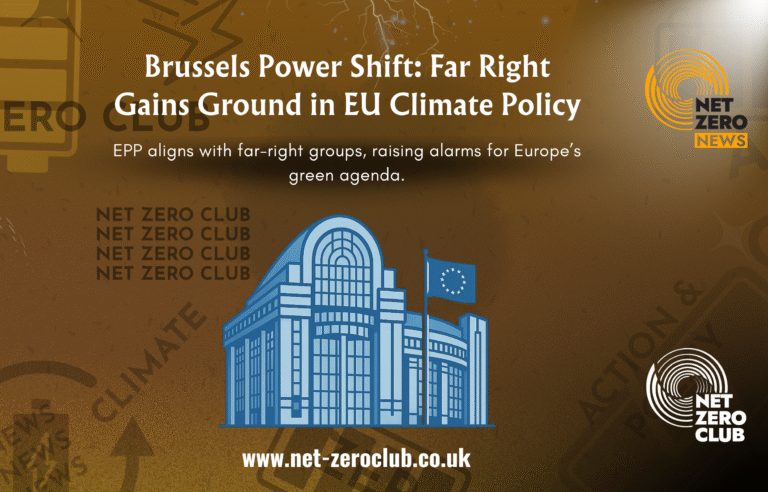Climate Talks Reveal a Fractured World: Key Insights

Welcome, Net Zero News readers,
The world is at a critical juncture. Our climate is changing faster than we can adapt, and the challenges we face are as fragmented as the political landscapes that govern our nations. Recent global climate talks have starkly illustrated this reality, highlighting the divisions within our international community and the urgent need for a unified approach to combat climate change.
As nations gathered to discuss strategies and solutions, it became clear that the path to a sustainable future is fraught with complexities. The climate crisis does not discriminate; it threatens every corner of our planet, yet the responses to it often reflect deep-seated inequalities and differing priorities among nations. The outcomes of these talks serve as a mirror, reflecting not just the state of our environment but also the state of global cooperation—or the lack thereof.
The climate negotiations, a platform intended for collaboration and innovation, sometimes devolved into a battleground of competing interests. Countries with abundant resources and technological advancements often clashed with those that bear the brunt of climate change yet lack the means to respond effectively. This disparity raises an important question: how can we forge a cohesive global strategy when the very fabric of our international relations is torn?
In the face of this fragmentation, the call for solidarity among nations has never been more urgent. The scientific community has consistently warned us that time is running out. The Intergovernmental Panel on Climate Change (IPCC) has made it clear: we must reduce global greenhouse gas emissions by 45% by 2030 to limit warming to 1.5 degrees Celsius. Yet the discussions at these climate talks revealed a stark contrast between rhetoric and action.
Developed nations, often seen as the primary contributors to historical emissions, were urged to lead by example and provide support to developing nations. However, promises of financial aid and technology transfer often fell short, leaving many countries with little choice but to negotiate from a position of vulnerability. This dynamic not only undermines trust but also hampers our collective ability to address the climate crisis effectively.
Furthermore, the geopolitical tensions that permeate our world today have also found their way into climate discussions. The ongoing conflicts and rivalries among nations often overshadow the urgent need for collaboration on environmental issues. As representatives from different countries stood at the negotiation table, it was evident that while climate change knows no borders, political agendas often do.
Yet, amidst the challenges, there are glimmers of hope. Grassroots movements and local initiatives are thriving, demonstrating that real change often begins at the community level. From innovative renewable energy projects in rural areas to urban sustainability initiatives, these efforts are proving that the fight against climate change can be driven by the people, even when political leaders falter.
As we reflect on the outcomes of the recent climate talks, it is crucial to recognise that the journey towards net zero is not solely the responsibility of governments. Businesses, NGOs, and individuals all have a role to play in shaping a sustainable future. Collaborative efforts across sectors can lead to innovative solutions that transcend political divides.
For instance, many companies are now committing to ambitious net-zero targets, recognising that sustainable business practices not only benefit the planet but also enhance their long-term viability. This shift in corporate responsibility reflects a growing awareness that the health of the economy is intertwined with the health of our environment. As consumers become increasingly conscious of their choices, businesses that prioritise sustainability are likely to gain a competitive edge.
Moreover, the role of technology in the fight against climate change cannot be overstated. Advancements in renewable energy, carbon capture, and sustainable agriculture are paving the way for a greener future. Governments and the private sector must work together to accelerate the deployment of these technologies, ensuring that they are accessible to all nations, particularly those most affected by climate change.
Education and awareness are also critical components of the climate solution. As more people become informed about the impacts of climate change and the actions they can take, a global movement towards sustainability can gain momentum. Initiatives that promote environmental education in schools, community engagement, and public awareness campaigns are essential to fostering a culture of sustainability.
In conclusion, the recent climate talks serve as a poignant reminder of the fractures within our global community. However, they also highlight the potential for unity in the face of adversity. As champions of net zero, it is our responsibility to advocate for collaborative efforts that transcend borders and bring together diverse voices in the fight against climate change.
The journey towards a sustainable future is not without its challenges, but with concerted effort, innovative thinking, and a commitment to solidarity, we can bridge the divides that threaten our planet. Let us work together to ensure that the decisions we make today pave the way for a healthier, more resilient world for generations to come.
As we move forward, let us remain vigilant and steadfast in our pursuit of net zero. The stakes have never been higher, and the time for decisive action is now. Together, we can turn the tide and create a sustainable future for all.
Thank you for being part of this vital conversation. Your engagement and commitment are crucial as we navigate the complexities of climate action. Together, we can make a difference.

 Got net-zero news, project updates, or product launches to share?
Got net-zero news, project updates, or product launches to share? 

